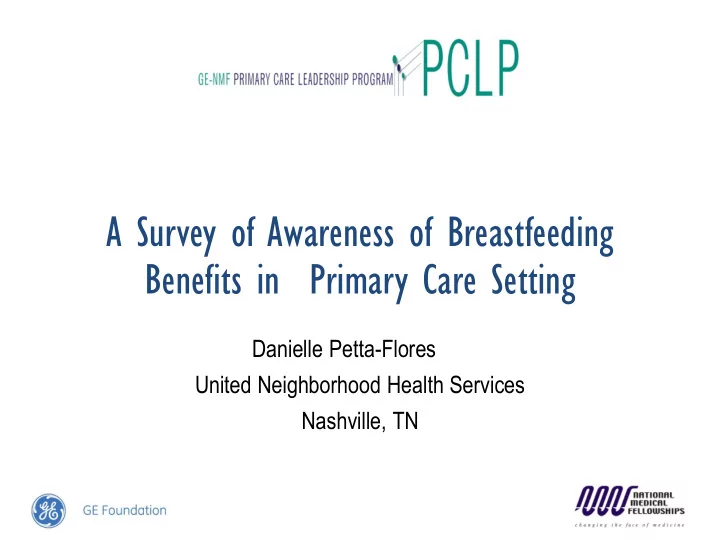

A Survey of Awareness of Breastfeeding Benefits in Primary Care Setting Danielle Petta-Flores United Neighborhood Health Services Nashville, TN
Introduction & Background • The American Academy of Pediatrics (AAP) and the World Health Organization (WHO) recommend that an infant be exclusively breastfed for the first 6 months of life and continue to be breastfed until one year of age. • Breastfeeding benefits for the infant include improved function of the gastrointestinal tract, decreased risk of acute infection, as well psychological benefits. • The United States Department of Health and Human Services set a Healthy People 2020 goal to have 81.9% of infants breastfed at least once.
Introduction and Background • Breastfeeding rates remain low among African-American women and low-income women. • United Neighborhood Health Services (UNHS) is a Community Health Center located in Nashville, TN that serves 24,000 primarily underserved and uninsured patients. 10,000 of these patients identify as African-American. • There are many complex reasons that a woman may choose not to breastfeed. This study aims to determine if there is a knowledge deficit among clients at UNHS in regard to breastfeeding benefits and recommendations, as well as evaluate current breastfeeding rates.
Methodology • A 17 question survey was developed for women of childbearing age. Questions consisted of demographic info, past breastfeeding experience, future breastfeeding plans, interest in learning more about breastfeeding, and 7 true/false questions about breastfeeding benefits and recommendations. • 140 surveys were distributed to 3 clinic sites. 14 were self completed during a medical appointment intake process. 26 were completed orally at a health fair.
Results • The average number of correct responses for the 7 questions was 3/7. • Of the women with children (n=28), 75% had not breastfed in the past. • 72.5% did not intend to breastfeed in the future. • There was not a statistically significant difference in average number of correct responses between women who intended to breastfeed in the future and women who did not intend to breastfeed in the future. • 80% of the women surveyed did not want more information about breastfeeding.
Results ( con’t ) Question Percent of clients who answered correctly For the first 6 months of life, breast milk is the only food a baby needs. 47.5% Breastfed babies are less likely to get infections such as diarrhea, lung infections, 42.5% ear infections, and urinary tract infections. It is recommended that babies be only breastfed for the first 6 months of life. 30% It is recommended that babies continue to be breastfed until at least one year of age. 30% If a mom is not eating a healthy diet, breast milk is still healthy for the baby. 52.5% If a mom is smoking cigarettes, she can still breastfeed. 40%
Discussion • 25% of the women with children had breastfed. The remaining 75% have never breastfed. This is far below the Healthy People 2020 goal of 81.9% initiating breastfeeding. • Only 30% of the women were aware of the current recommendations by the AAP and WHO to breastfeed exclusively for the first 6 months of life and continue to breastfeed until at least one year of age. This is an area where intervention could be targeted. • This is a small sample (n=40). Increasing the sample size and the diversity of the sample could gather more statistically significant results.
Recommendations • Promote breastfeeding benefits and recommendation in the clinic through prenatal education, posters, brochures, etc. • Further inquire as to why women are not choosing to breastfeed through a focus group. • Educate the staff on breastfeeding benefits and recommendations to increase buy-in from staff. • Partner with delivering MDs/CNMs to provide support for breastfeeding mothers with education, lactation specialists, etc.
Conclusion • Breastfeeding is beneficial for infant and maternal health • Many of the women surveyed at UNHS were not aware of breastfeeding benefits or recommendations. • Interventions to increase breastfeeding rates could start with education about the breastfeeding benefits and recommendations.
Acknowledgements • Will Wyatt M.A. – Site Coordinator • Lois Wagner PhD, APRN-BC – Academic Advisor • General Electric • National Medical Foundation – Primary Care Leadership Program • United Neighborhood Health Services • Samantha Haun
Recommend
More recommend